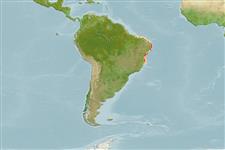Teleostei (teleosts) >
Eupercaria/misc (Various families in series Eupercaria) >
Lutjanidae (Snappers) > Lutjaninae
Etymology: Lutjanus: Malay, ikan lutjan, name of a fish; alexandrei: The specific name honors the pioneer Brazilian naturalist Alexandre Rodrigues Ferreira (1756–1815), whose many years of field work in Brazil during the late 18th Century remain underrecognized due to the confiscation of his and others’ collections at Lisb.
Environment: milieu / climate zone / depth range / distribution range
Ecology
Marine; demersal; depth range 0 - 54 m (Ref. 57982). Tropical; 1°S - 18°S
Distribution
Countries | FAO areas | Ecosystems | Occurrences | Point map | Introductions | Faunafri
Southwestern Atlantic: the Brazilian snapper, L. alexandrei is only recorded from the tropical portion of the southwestern Atlantic continental shelf, and has a narrower latitudinal range than other Western Atlantic species of Lutjanus. It is known from the state of Maranhão (00°52’S) to the southern coast of the state of Bahia (18°0’S), Brazil, in areas under the influence of the west-flowing Equatorial Current (northern Brazil) and the south-flowing Brazil Current (northeastern Brazil). It is apparently absent from oceanic islands. Additional collections may show an even broader distributional range for this species, as was the case with 48 other poorly known reef-fish species in the southwestern Atlantic (Ref. 57982).
Size / Weight / Age
Maturity: Lm ? range ? - ? cm
Max length : 33.1 cm TL male/unsexed; (Ref. 100833); max. published weight: 199.90 g (Ref. 122735)
Adult standard length is greater 20 cm (Ref. 57982).
Life cycle and mating behavior
Maturities | Reproduction | Spawnings | Egg(s) | Fecundities | Larvae
Moura, R.L. and K.C. Lindeman, 2007. A new species of snapper (Perciformes: Lutjanidae) from Brazil, with comments on the distribution of Lutjanus griseus and L. apodus. Zootaxa 1422:31-43. (Ref. 57982)
IUCN Red List Status (Ref. 130435)
Threat to humans
Harmless
Human uses
Tools
Special reports
Download XML
Internet sources
Estimates based on models
Phylogenetic diversity index (Ref.
82804): PD
50 = 0.5000 [Uniqueness, from 0.5 = low to 2.0 = high].
Bayesian length-weight: a=0.01514 (0.01340 - 0.01710), b=2.97 (2.95 - 2.99), in cm total length, based on LWR estimates for this species (Ref.
93245).
Trophic level (Ref.
69278): 3.8 ±0.7 se; based on size and trophs of closest relatives
Generation time: 4.6 ( na - na) years. Estimated as median ln(3)/K based on 1
growth studies.
Resilience (Ref.
120179): Medium, minimum population doubling time 1.4 - 4.4 years (Preliminary K or Fecundity.).
Fishing Vulnerability (Ref.
59153): Low vulnerability (23 of 100).
Nutrients (Ref.
124155): Calcium = 128 [76, 279] mg/100g; Iron = 0.649 [0.366, 1.246] mg/100g; Protein = 17.5 [16.0, 19.1] %; Omega3 = 0.236 [0.129, 0.407] g/100g; Selenium = 71.9 [35.8, 149.1] μg/100g; VitaminA = 67.7 [12.1, 339.4] μg/100g; Zinc = 0.553 [0.362, 0.862] mg/100g (wet weight);
